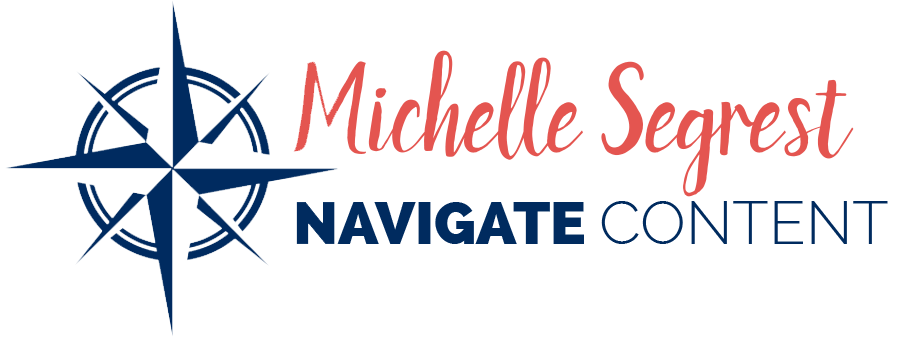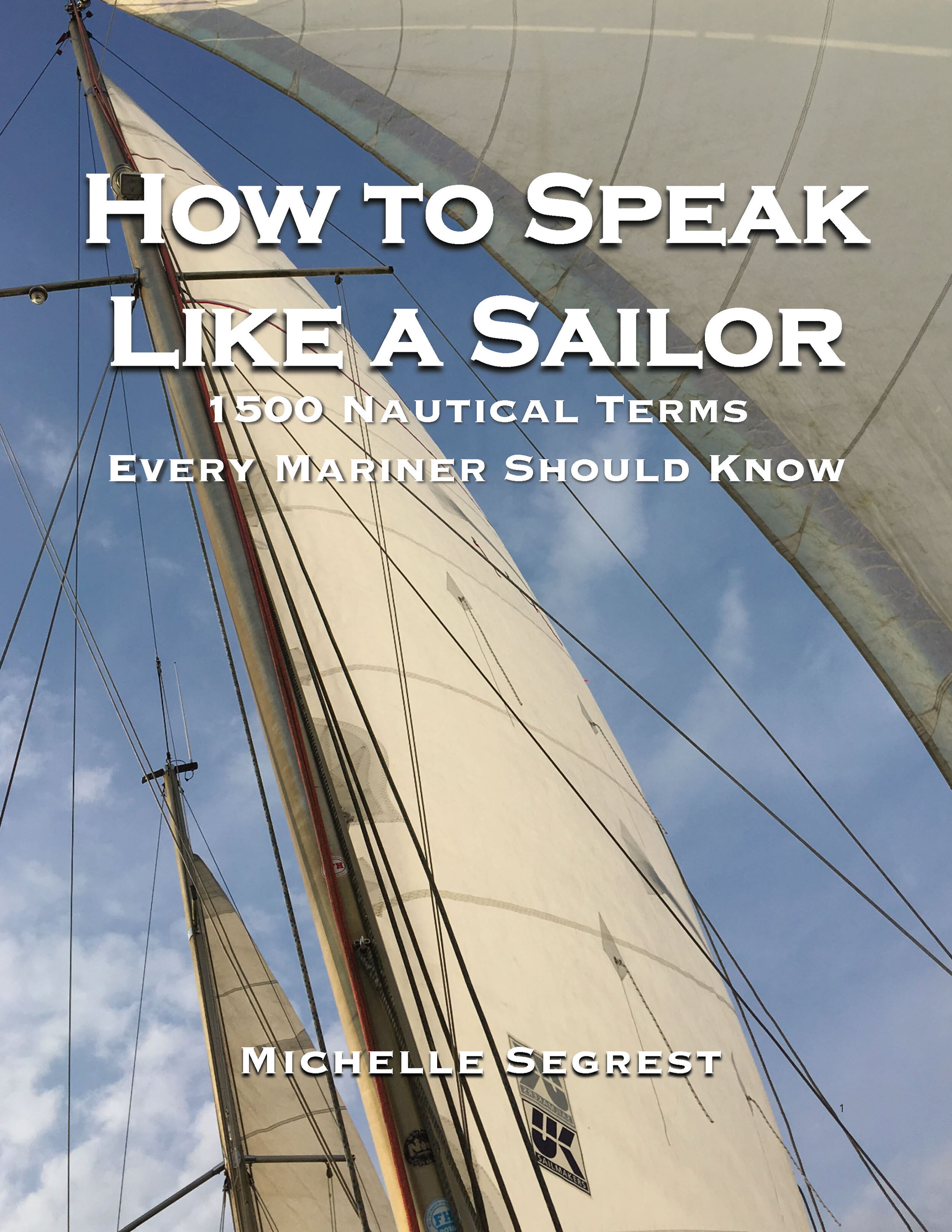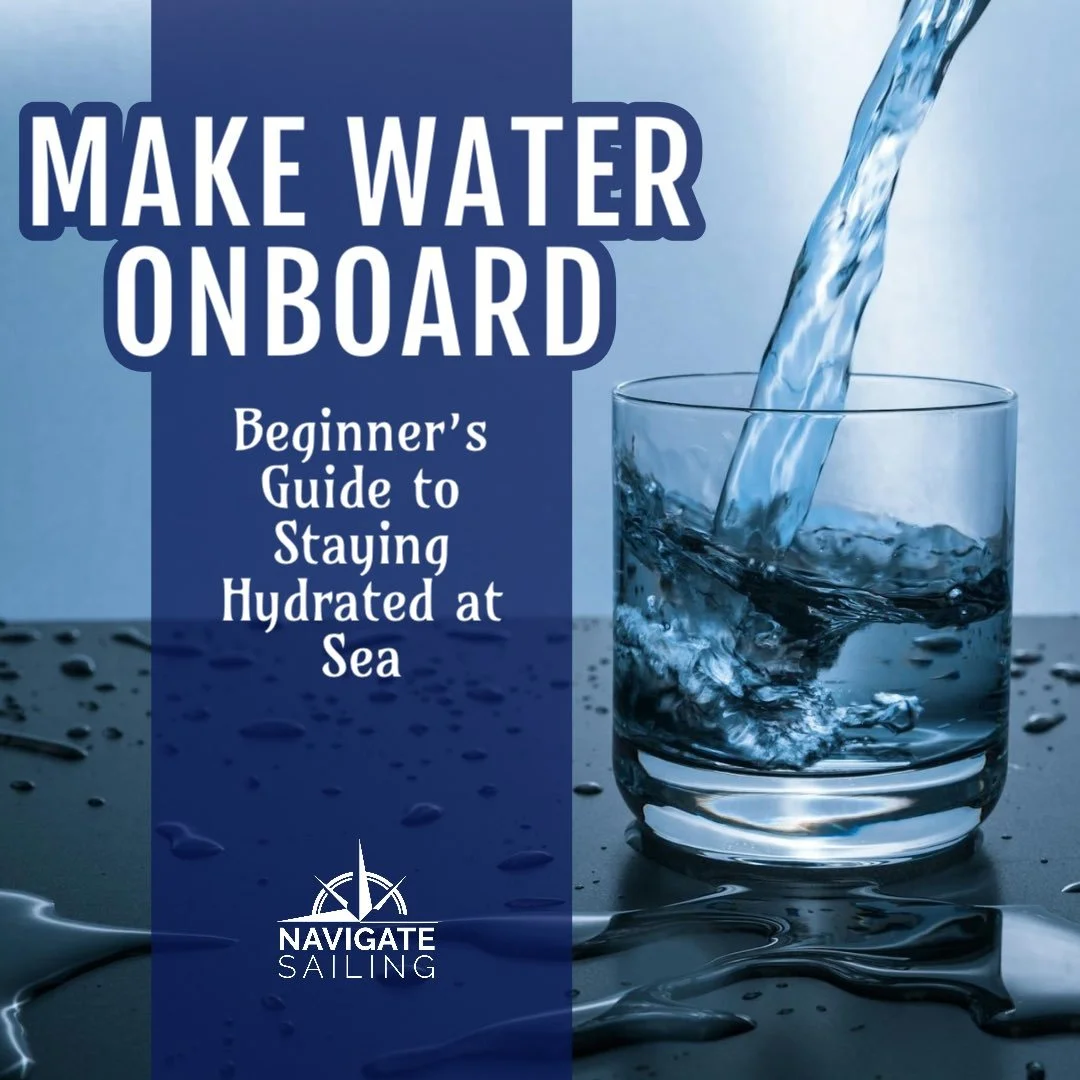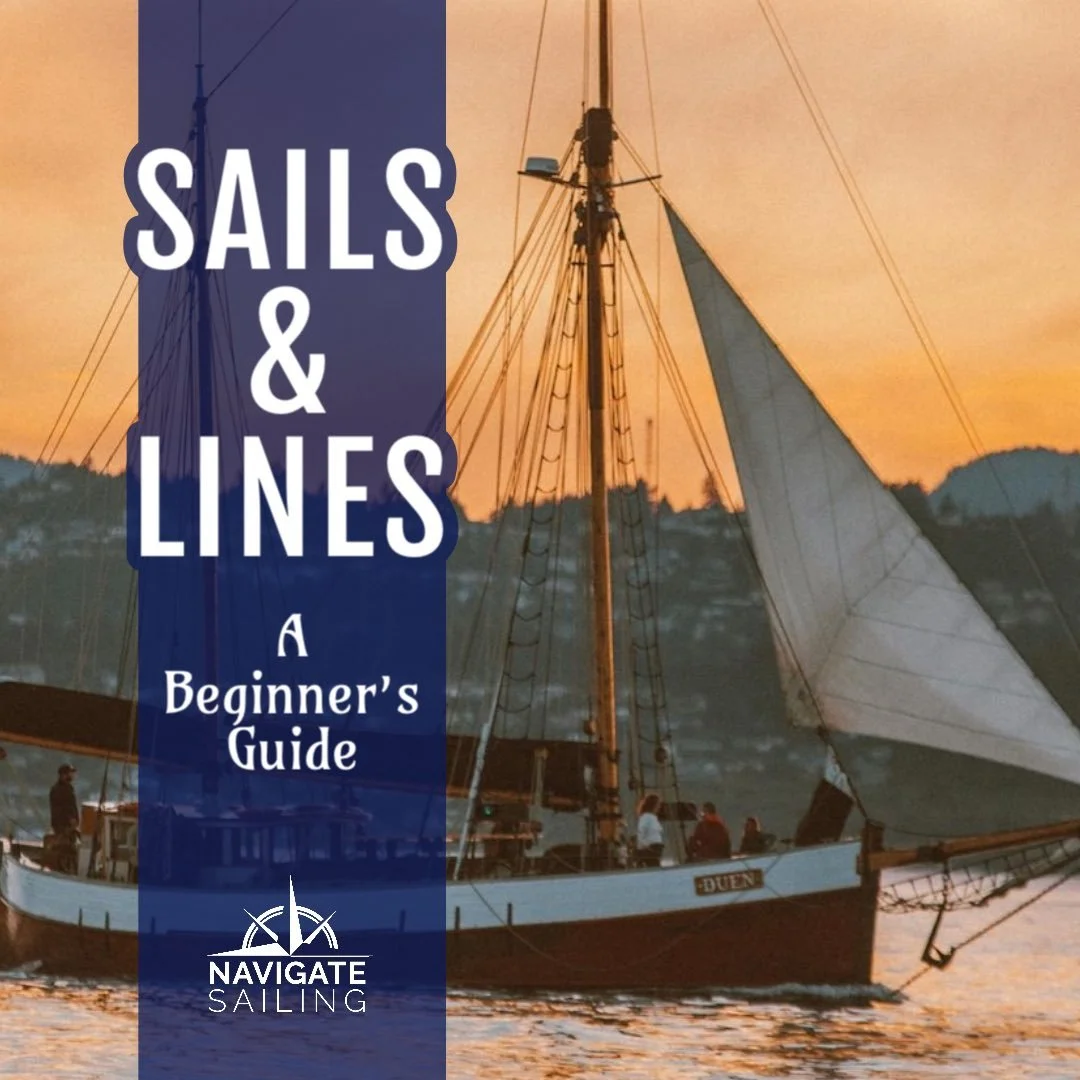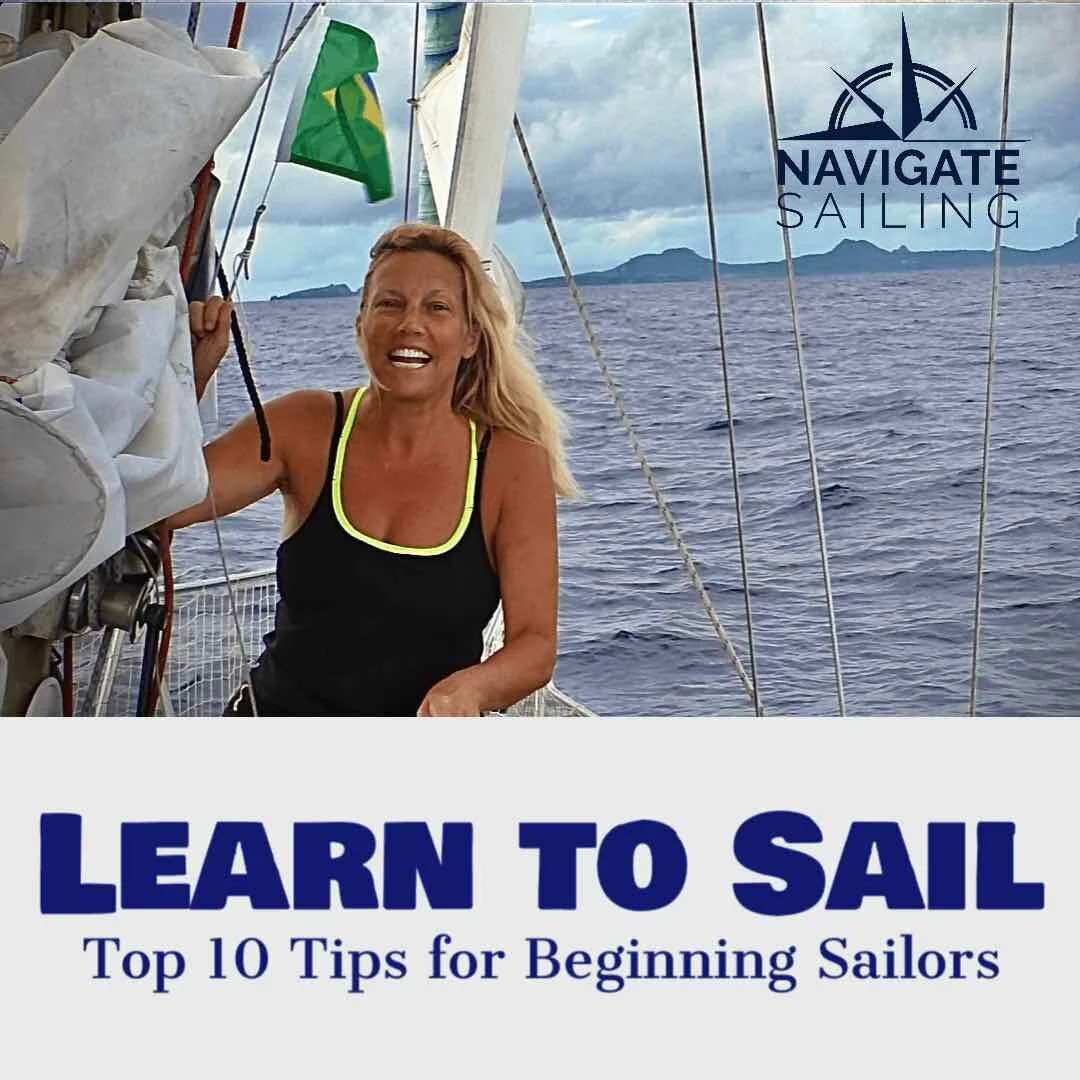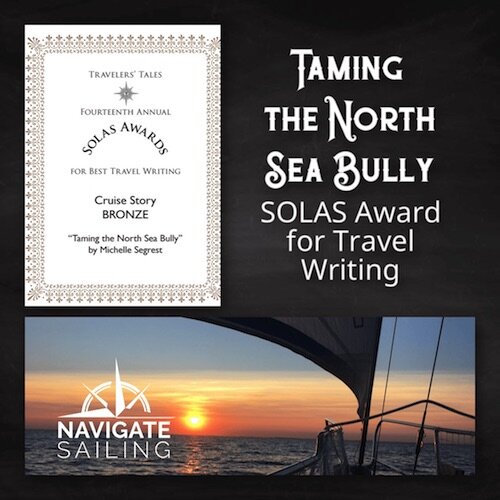Sailing Ruby Rose—Sailors and Their Stories (Exclusive Q&A)
/By Michelle Segrest—How to Get Your Sea Legs
Nick and Terysa of Sailing Ruby Rose have been sailing the world for almost a decade and documenting their adventures on YouTube. They recently sold their beloved yacht and are now building a custom catamaran to continue their adventures on Ruby Rose 2. They graciously sat down for an exclusive interview about how they got started sailing full-time, the marketing strategy for their brand, their sailing adventures, and their future plans.
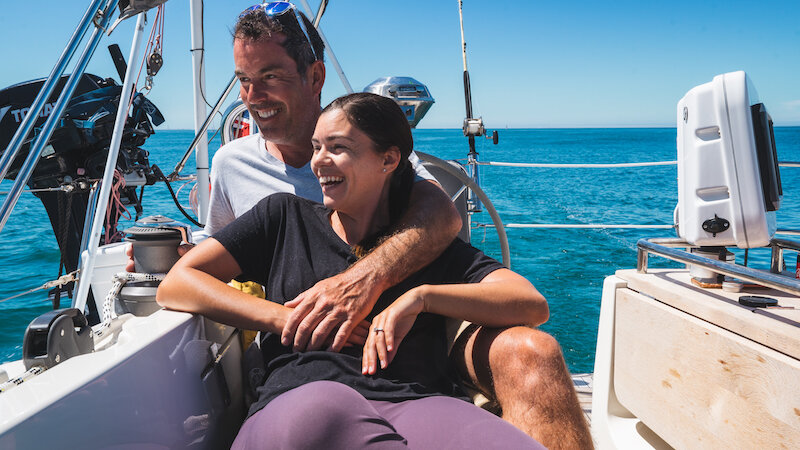
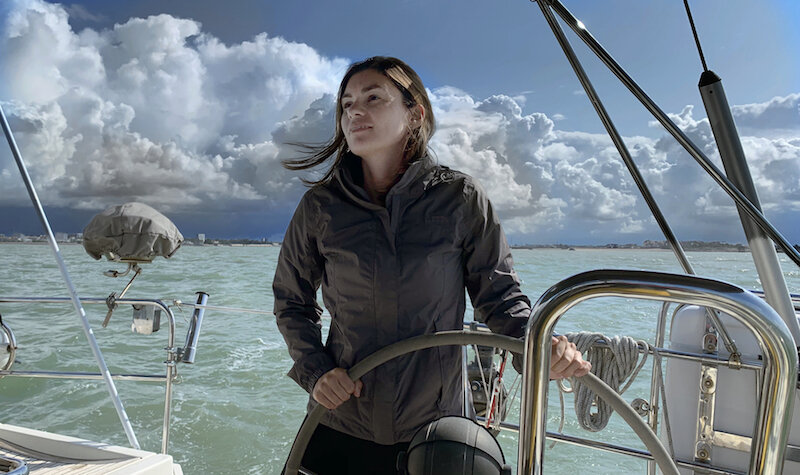
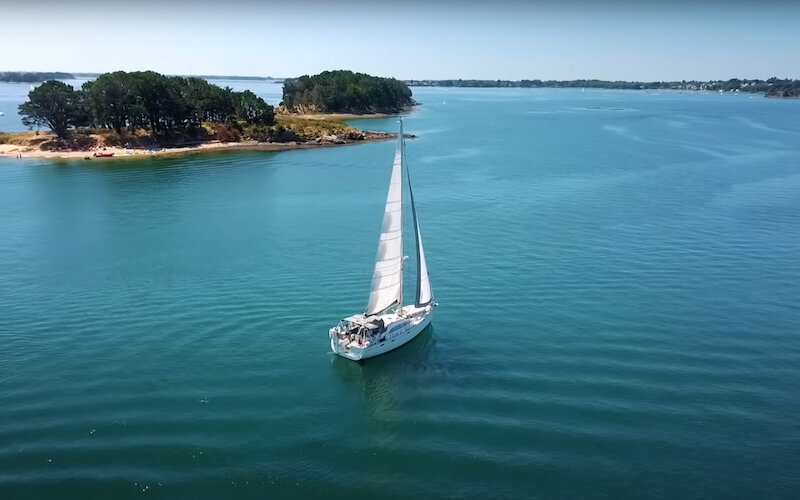
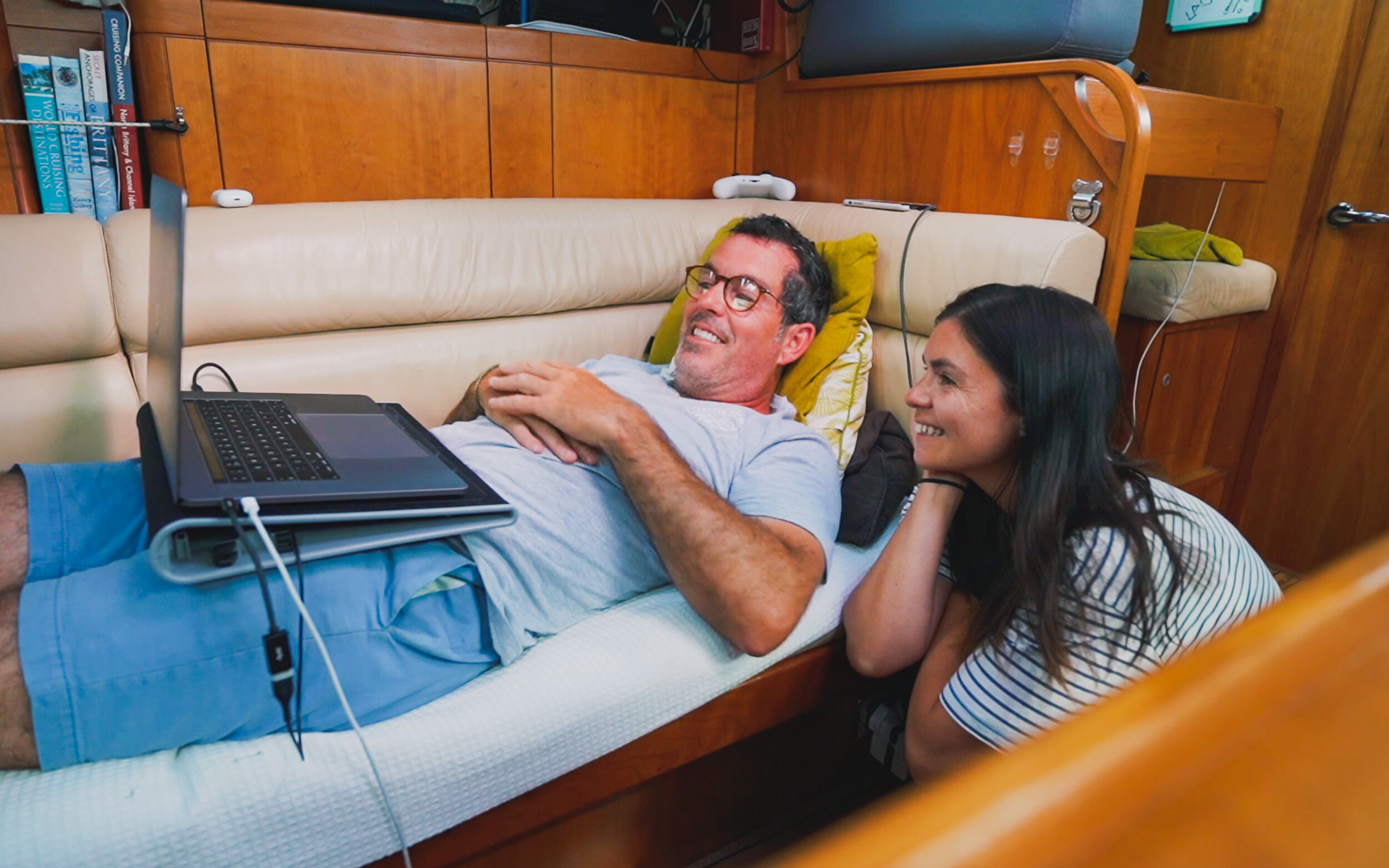
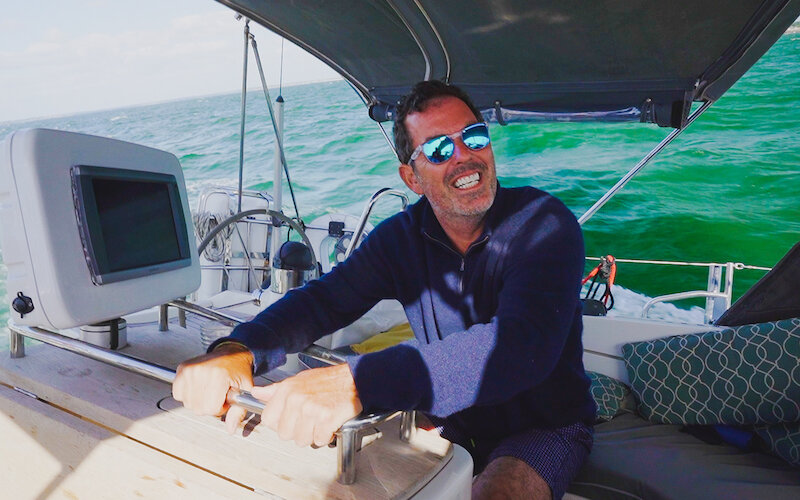
What was life like before you began your full-time sailing journey?
Terysa: I was a paramedic living in Australia, and Nick was a dentist living in London. We met while traveling 11 years ago. The following year, I moved from Australia to London. We lived together in London for about five years working and saving and obviously dreaming and planning. We knew that we both wanted to have a lot more traveling in our lives. We knew that we wanted our future to be one of adventure.
We didn't want to be settling down and going to work and doing the same thing every day for the rest of our lives. That's not what we saw in our future. Once I moved to London, we started talking about what our lives would actually look like. Nick was a sailor, and he taught me how to sail. It wasn't a lightbulb moment like, oh we should go sailing, but we kind of naturally came to the conclusion that we could merge the sailing and the travel and adventure, so obviously this was the answer.
At the time, we didn’t know that living onboard and full-time cruising was a thing. It never occurred to us as something that people actually did. This was before sailing blogs and YouTube channels were really popular. For us, it was more planning and dreaming. Once we realized that was something that people did, it just seemed like it just ticked all the boxes of what we wanted for our future.
Did you just quit your jobs and head out or did you go part time at first?
Nick: It was a bit of a high break. In the two years before we actually left, we decided to go sailing for six weeks. Okay, so we took the whole summer off. I let my business partner just run the business. That was more to kind of just make sure that we were going to get on with living on a boat. The theory is great, but it wasn't the biggest boat in the world, and we just wanted to kind of get a mini taste of it. So, we did that the year before and the previous year just to get ourselves in the mood for it.
When Terysa and I met we also met another couple who had taken a year sabbatical to go and see the world before they went back to work. He was saying that after six months and a day, or the year off they were on a downward clock to go back to work. For them, this kind of spoiled it.
Being a dentist is not the sort of thing you can just pick up and put down and leaving the business in the hands of someone else would never have worked. I had spent probably 15 years getting to where I wanted with the business, and I had a pretty successful private dental practice in the middle of the financial district of London. It's not as if I could sell that, and then pick it up again in a few years. It wouldn't even be a sideways step. It actually would have been a massive backward step. It takes at least five years to get that off the ground.
Terysa: We were not in careers where you can go part time. So, for us, you must commit to leave. If you go part-time, you lose your skills so quickly. We had the option of sailing for six months and working for six months. But that would have been way too hard.
Nick: A lot of people ask, “Why don't you do dentistry on your boat?” Other than the obvious reason—because I don't want to—but turning a cabin into a surgery would just be such a bummer.
Terysa: It would also be a bit of a disaster waiting to happen with regard to insurance and other things.
Did you sell the business? Did you have a nest egg of money and decide to sail until this runs out? Did you think you would be earning money while sailing?
Nick: Basically, the way that our financial situation works is that we kind of had a vague plan that we would give it two years and then after two years we would re-assess and see if we still like it. There are a lot of stories about couples setting off, and then the reality doesn't match the dream.
We had a house with an apartment, and we made the decision not to sell the furniture or the house. We rented out the house. We have this vague, financial model whereby we saved up probably about $30,000. We have that in the bank. We took the whole proceeds from the sale of the business and decided not to touch that at all.
So, we've got this little $30,000 pot that we saved. It took us five years to save that much money. Then, we have the rent from the apartment just to kind of top that off. The rent wasn't covering our living expenses. But we kind of figured that would give us two years and then if after two years we both said, “Look, this is great, but it didn't work.” Then we could put all our furniture back in the apartment and throw the tenants out. So that was it. That was our entire financial plan. It was a pretty basic business model.
When you first started doing this there weren't YouTube channels out there, and Patreon was not well known. I got my inspiration from a book about Lin and Larry Pardey. When did you discover these money-making options, and what made you decide to give that a go?
Terysa: When I first moved to London about 10 years ago, we were getting our inspiration from a book that Nick read called “Bumfuzzle.” We found it very, very inspiring so I started reading his blogs, and this led me to other blogs. That was where the early inspiration came from, and then I started watching LaVagabond and Delos videos just before we left. This was back in 2015.
Once we had been sailing for a couple of years, we took a break in the latter half of 2016. And by this point there were a lot more sailing channels coming on to the platform. It didn’t occur to us that we could make money doing this, but we thought, “Oh, that looks like fun!” It looked like something that would be relatively easy to do because we were thinking that a lot of our friends and family don't really get what we were doing. I had a blog myself that I enjoyed, but I could tell when I would talk to people that they still didn't understand. And I thought well, it's probably best that we just start a YouTube channel. It will give us something to do. It was a creative outlet. It will intellectually stimulate us, and it just seemed like a fun thing to do. Initially, I thought “How hard can it be?”
In my naivete I thought it would be super easy. Of course, the first episodes were super easy, but not very good.
The people who watch these videos are expecting high-end, well-made, cinematic videos. How do you keep up with the quality?
Terysa: We started ours at an interesting time. It was right on the cusp. The first group of YouTubers were a really cool group, and they kind of set the scene. They really got everyone inspired. We came on toward the tail end of that first group when viewers were still quite forgiving.
Now, because there are so many to choose from—and the quality generally is so high—it is hard to come onto the scene. We have no experience of filming or editing or anything so it’s difficult to meet the expectations of the viewers. We first assumed that it would just be friends and family watching. We didn't think of anyone else really, and then once people started commenting, that was a strange experience.
It starting to gain some traction. After the first six months we started having conversations about where it was going, and I think that at that point we realized that we were building this really amazing audience. There was some potential there to go in a more business direction. So that was a turning point, but we started off treating it very much as a hobby and I think that comes across in the early episodes.
I think the audience does relate to that and in some respect you either have to have brilliantly produced videos or you have to relate to the audience somehow. You have to have an interesting story to tell.
Nick: I believe that if we were to start a channel now, I don't think we would get any traction at all. It’s only a hypothetical, but I think that in the three years that we've been going it has changed so massively. It's not what it was. There are now 2,200 sailing channels on YouTube. Also, YouTube has changed completely in the way that the algorithm works—the way it selects videos and the audience. The expectations have changed. Now, you get channels that are just starting out that have a background in cinematography and the first episode could be on Netflix right now. We are all within the bubble of what are we are doing to kind of push each other to raise the bar, and the bar is set so high now.
I'm interested to see where it goes in the next two or three years. I think that the standard is going to increase. It hasn't stopped so far, and I think that's going to be quite off-putting for new creators. I do not know how YouTube will change. How sailing channels will change is going to be exactly how YouTube wants to change as a whole.
We’ve taken some advice on this from companies that actually give you a little bit of guidance, and a lot of them have said that YouTube is going to essentially split into two where one part of it is going to compete with Netflix and Hulu and those creators will be expected to produce very, very high-end material, filmed on very high-end cameras with editing to die for. The other end is going to be cat videos and holiday videos. So, you get to choose which category you want to be in.
The thing about sailing is the limitations within that niche of how to grow a channel are pretty constraining. Essentially, for most YouTube sailing couples, there's just two of you. It's difficult to find regular internet. So, you have to find an offline editor, which is almost impossible to find. It gets to a point where your business model becomes too big to handle with just two of you.
Terysa: Logistically, you can't really bring on anyone else. It’s a challenge for us all.
Nick: Delos has a brilliant business model, which they're lucky to have. It's two brothers and then those two brothers have partners. Then they took on crew that can edit or that have skill sets that were valuable to their business model. They grew their brand this way. It’s genius.
Do you think the video making and making it a business takes away from the sailing and onboard living experience?
Terysa: I generally feel a lot more satisfied now than I did three and a half or four years ago before we started because we left at a time where we are not retired. We were still very much working age. I needed some kind of project. I needed something to keep me busy. I mean, I wasn't a workaholic by any stretch, but I still needed something to do. Having this business takes up every waking, breathing moment. You never get a break from it. Sometimes you end up sitting on the boat editing when you'd much rather be out exploring or doing other fun stuff, but that's the nature of work. If you are living a land-based typical life sometimes you are looking out the window on a beautiful day and wish you could go out for a walk.
I don’t see it as any different than that.
Nick: For us, it’s never been about the money. We had this mandate when I ran the dental practice that basically said if you just focus on the quality of the service that you're providing and don't ever think about the money then you will make the money. If you think about the money, you will never get the patients. We took this philosophy into the YouTube channel. There was a point after we'd sailed across the Atlantic, and we were sitting in the Caribbean, that we realized that there was something missing from what we were doing. We now had a need to be creative or to actually use our brains. That was a big moment for us. It was one reason why we started the YouTube channel.
Then as it developed, a couple of things happened. I had some conversations with certain sponsors. We asked them about doing A, B, C, or D or E for us and they said well, no one's ever asked us for that before. It made me think that we are working with other channels, and why is no one asking for affiliate links or putting a business spin on this? Why aren’t we being more productive?
Terysa and I have applied some skills we learned from our civilian life that yields pretty positive results. This gives us a better quality of life—finances aside.
Do you still have your little nest egg that you set aside? Have you had to touch that yet?
Nick: We still have it. But if anything, 2020 has shown us is that you don't know what the future is going to hold. We are moderators for a couple of the Facebook groups that deal with YouTube sailing channels and one question that gets thrown up every couple of weeks is, “I've almost got 1,000 subscribers, and when I get to 1,000 should I monetize my channel?” This is the earliest you can monetize a channel.
Terysa: We made a decision to not monetize until we got 10,000 subscribers. In 2017, I had never heard of Patreon. It was still quite new. But we decided not to join Patreon until we reached 20,000 subscribers, but we actually didn’t do it until we reached 40,000 subscribers. We always put the content first and the income second. We get emails almost every day offering us sponsorship deals. We could be earning a lot more money than we do by taking some of these sponsorships, but we feel it would devalue our product. This is why a lot of YouTube creators turned to Patreon.
Nick: With regard to the amount of money we could make . . . the amount of footage that we take we could put out two episodes a week. If we halved the amount of time we spend editing and halved the quality we put into it, we could double our output and therefore grow faster. We chose not to do that because there's a lot of joy in actually crafting a story and the whole process of making something beautiful.
We have a finite amount of time to collect film and to edit. We are not focusing on making it the most profitable. Our focus is making a product that we are happy with. We like having control over it.
Of course, you have that nest egg and there are some people out there who don't have that. What advice do you have for them?
Nick: We are asked this question a lot. Does this nest egg give us more confidence to do what we want? Honestly, I think having the nest egg has made very little difference to what we have done. Yes, we could make more money, but I gave up dentistry because I wasn't interested in money. Obviously, you do have to have a certain amount of money to be able to sail full time, so I do understand the hypocrisy of the statement. But you are right. We have a nest egg we can go back to. But I would honestly like to think that we would have made the same decisions.
Obviously, YouTube is changing, and it is a business. The way we treated this brand 18 months ago is different to the way it is now. I honestly see growth potential in what we are doing as a brand. I am adamant that the business plan that we have is the way to go. I kind of hedge my bets here because if it's not the way to go and I've got it wrong, we will still be able to look back on this in 20 years and think we made the best content. There does come a tipping point where you are making enough money to cover your monthly expenses. And once you've done that it does change your view.
The honest driving force in how we decided to work is quality of life. We worked some crazy hours when we were in London. It got to a point a few years ago where we were just working the channel too hard and sailing too much and it stopped being enjoyable. At that point, we decided to just get the best quality of life that we can. And that quality of life doesn't just come from sitting on a beach and drinking a cocktail. It comes from feeling fulfilled in your work and not burning yourself out and finding time for each other and time for your family.
It's like having 12 balls in the air.
But one of the biggest balls—the most important one—is to be able to not run out of money while crafting something that still makes you money. We are pretty lucky. I think that the skill sets that we took from our civilian life carried a lot into building this brand of ours, and I think that's helped.
I always get asked how much it costs to live full time on a boat and sail the world. My answer is that it costs what you’ve got. What is your answer to that question?
Terysa: We get asked that question all the time and it frustrates me because you could also say well, how much does it cost to live in a house? So, there is no answer to that. It costs what you have. It costs what you want to spend.
If you had a crystal ball, do you see yourself still sailing full time 10 years from now?
Nick: I’ll sail until I can’t sail.
Terysa: The thing is that there are so many negatives with sailing and living on a boat. It’s not all peachy and fun all the time. You have to find a way of balancing those issues. The issues that we've identified as problematic are the inconvenience of living in the small space and not being able to just hop in the car and drive down to the supermarket. That can get a little bit irritating but that's all fine. I think that the main thing for us was feeling isolated from our families, our friends, and a community. Yes, sailing has a community, but as you know, that can be quite transient. You don't necessarily have close physical contact with your neighbors, and the neighbors change all the time. This can be fantastic because you meet so many different people, and it is a very dynamic situation. You are constantly meeting new people and widening your life experience by having so many colorful characters come into your life.
But you also need those people in your life who have been there for a long time. We need to continue to nurture those relationships, as well. I think that we have identified that we really do need to have that balance of spending time on our boat sailing and doing what we love, but also going home to see our families and friends.
What do you hate about living on a boat?
Nick: I don't hate anything.
Terysa: What about the seasickness and the stress of the responsibilities?
Nick: Yeah, there are some wrinkles. On a scale of zero to 10 where zero is mild dislike and 10 is hate, I don’t think anything comes above a four. Seasickness is bad, but you can suck it up and get over it. The sense of responsibility that I have toward Terysa is something I cannot get over. I would find it easier to sail on my own or with paid crew. It has nothing to do with her ability. She’s a better sailor than me. I don’t have the same responsibility for a crew as I would for your partner. It’s one of the things I live with. But none of it is enough to make me ever consider giving it up. I'll take seasickness for days on end.
Terysa: Of course, there are days when I’m just over it. I think…this is annoying. I haven't slept for three days because we’ve been offshore, and it was really rough. There are times when your tolerance begins to run out. We’ve been in that headspace before—usually on long offshore passages when you are really sleep deprived. At no point have I seriously thought, “I’m over it for good.” I haven’t even come close to that point yet.
Nick: There are high highs and low lows. But the highs make up for it. Life on a boat is just like the real world with the color turned up. Everything is just so much better. Sometimes life is changing on a daily basis. You meet people and sometimes you'll see them for two days and then become lifelong friends. We just love it! It’s always a different dynamic.
Yes, there are times when we're both miserable, but it’s completely offset by things like finding a deserted anchorage or finding that amazing sunset, or simple things like picking up a coconut on the beach. I don't think we will ever give up sailing. I think the nature of how we sail will change. We know we won’t do the YouTube thing forever. I don’t want to be the bugger banging out videos at 60. At some point you just want to sail and enjoy the experience.
Terysa: We will want to move on to something else at some point. That's what we're like. We've always been like this—separately and together. We set goals. We achieve them, and then we're like… what's next? With YouTube, the goalposts are always moving.
Have you sailed all your life?
Nick: No, I began sailing in my early 30s. Now I’m 49. Terysa is 34. Terysa came sailing with me but I didn’t really teach her to sail.
Terysa, how hard is it to learn to sail from someone that you love? How do you separate the teacher from the partner?
Terysa: Well, it's very difficult, and I don't recommend it—unless you have a very specific personality and let's say the partner you're learning from is a natural teacher and takes that teaching role very comfortably. Nick is not that person. It’s not about him not being willing. It's just that it doesn't come naturally to him.
When I started sailing with Nick, I didn't have that level of enthusiasm and passion that I do now. Some people come into and they're like, oh my God, I'm so excited to do this. That wasn’t me. I started sailing because if I wanted to spend time with Nick then I would have to go sailing every weekend. It’s not like I came into it passionately at the beginning.
Once it became kind of clear to me was when I realized that sailing was a conduit to this adventurous lifestyle that I wanted. That's where my interest started. Once we started talking about moving onto a boat and developing a plan, I began embracing it more seriously and passionately. I became more proactive in learning how to sail. I thought about taking courses, but realized I already knew a lot of what you learn in courses. But it was a bit of an uphill struggle because as I said, it wasn't easy learning from Nick, so I kind of learned by observing and then asking questions of Nick and of the other sailors that we met. I mainly learned by observation and listening to people talk about sailing. You just have to get experience and learn from your mistakes.
Nick: I think liveaboard sailing is actually a test of character more than a test of sailing. You could take Terysa and throw her on a boat and she would learn to sail in a day, but she's got the character to be a live aboard sailor. She's got the character to be a good sailor—you know the traits that you need to be a good liveaboard. You have to be able to think laterally. You've got to be level-headed. You have to be able to have a strong stomach and fortitude.
If you've got those traits, then everything else becomes secondary. My best friend is one of the most competent sailors I've ever met, and he's got no qualifications at all. He's amazing, and he teaches us stuff every time he comes sailing with us. I have another friend who was a yacht master instructor. I wouldn't trust him with a paper boat. He is a liability. So, formal qualifications mean nothing. A lot of practical experience, but also character traits, actually mean a lot more. This applies when we get asked about taking crew on long passages. They may have skills, but you have no idea about their character.
Nick, what have you learned about Terysa’s character through this experience? And Terysa, what have you learned about Nick’s character?
Nick: She is strong-willed, and actually, strong-willed doesn't do justice to it. She is a very, very, very strong-willed woman. My mother is a very strong-willed woman, and my grandmother was too. They were strong but dominant. Terysa is strong-willed but passive. She's very softly spoken. She very rarely gets upset. She's very, very level-headed, and in many ways stronger than my mother.
Terysa: When we had our first year of sailing, we learned so much about each other. It wasn't stuff that we didn't already know. I think it was just shining a spotlight on certain character traits that we've not given much attention to before.
I'd always known that he is an excellent problem solver that he can do lots of stuff and work things out in his head, but I never really appreciated how clever he is. I think that's the thing. Nick's cleverness is not like normal intelligence. He can basically work anything out.
He’s Italian, so he’s very dramatic. This is why he probably thinks I’m level-headed. I’ll sit there with my cup of tea and say, “It’s Ok, babe, you’ll work it out.” And sure enough, within a few hours, he’s worked out how to fix whatever was broken. He’s never been defeated by anything going wrong on the boat. He just has that cleverness. It's just the way his brain works. He can work anything out, but it's also about how he says I'm strong-willed, but he will literally not go to sleep until he has fixed that thing.
We are very determined and stubborn in our own special ways.
What are things that you cannot live without on the boat?
Terysa: Coffee is number one. We have an espresso machine. The next important thing is good bedding. You need a good pillow and a good mattress and good sheets. Invest in really high-quality stuff. I once bought some sheets at the supermarket once, and it was awful!
Nick: The other thing is the higher thread count the longer they take to dry. So, there is a flip side. The other necessity for me is music. Whether it’s my guitar or an iPhone, I have to have music and headphones.
Terysa: And we have to have our Kindles.
What’s been your favorite destination so far?
Nick: I hate this question. But I would say Martinique.
Terysa: My favorite is South Brittany in France. It’s the best cruising ground in my opinion.
Nick: I think our future is sailing South Brittany.
What’s been your toughest, most difficult passage?
Nick: Both of mine were the Atlantic Crossings—one way, then the other way. The one coming back was difficult because of the weather. It was challenging because the last eight days no one really slept. The weather was bloody awful and so it was just a challenge just going about life on board, especially on a monohull. The boat was heeling the entire time. Every 10 seconds you got tossed across the boat. So that was tough from the point of view of the most difficult passage physically.
Psychologically, the first Atlantic Crossing was difficult because it was the first time I was worried about so much. It's one of those things that you don't really appreciate how amazing it is until you are looking back on it, because you worried so much about things going wrong at the time. I think those two for different reasons.
Terysa: Yeah, I agree. We did a passage from Morocco to the Canary Islands, which was about 220 miles. The weather forecast was incorrect. The wind was way, way stronger from a slightly different angle and we hadn't yet put our third reef in. So, we had to have just a second reef the whole time. I just remember it was pitch black and I'm sitting there on watch and I didn't have as much confidence in the boat then as I do now because I didn't have the experience.
What advice do you have for people who want to do what you do—living on a boat and sailing the world?
Nick: I think that a lot of people think that they can just go from “I want to live on a boat,” to living on a boat. I think that you have to just break it down into small chunks. Set a goal and then understand getting to that goal can take sometimes five years. I think there are four main things that stop you from going.
First is money. If you don’t have the money, you don’t have it. The second is health, and
that is normally age-dependent. There is a golden opportunity that you have. The third are commitments at home with regard to family, whether it's children or elderly parents, and again is all in this golden window. The fourth—and it’s the biggest one—is yourself. You find your own obstacles and reasons not to go. What is the biggest battle that you're going to have? You can make excuses. The boat is not quite ready…I'm just going to wait for the kids to graduate… I'm just going to wait for my investments to grow a little bit more.
We’ve met a lot of people in marinas and sailors around the world and you know the ones that are never going to leave. They are making all kinds of excuses to continually keep the dream alive. And then we have friends who just wake up one day and go.
If you were writing a story about yourself and about your experience, what would be the headline?
Nick: It depends on the angle you want to pursue. You either want to know about the journey we have a sailors, or you want to know about the journey that we have as YouTubers and honestly those two they're completely different. There's an overlap.
If it's a sailing thing, “How we turned our dreams into a reality and kept going.” Sailing is half of it. The other half is to keep going, maintain the relationship, and not destroy your finances.
If it’s a YouTube thing, it’s “How a small YouTube channel managed to change the marketing of the sailing community forever.” We completely changed the market for the foreseeable future. It’s nice to be instrumental in that.
